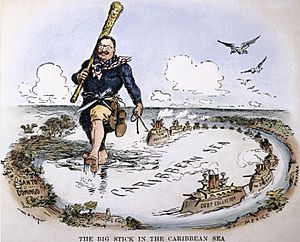Foreign policy of the Theodore Roosevelt administration facts for kids
Theodore Roosevelt was the President of the United States from 1901 to 1909. During his time as president, he focused a lot on America's relationships with other countries. He wanted the U.S. to be a strong and important country on the world stage. He worked to expand America's influence, especially in Central America. He also made the U.S. military stronger and helped solve big international disagreements.
Contents
Building the Panama Canal
One of Roosevelt's biggest goals was building the Panama Canal. This canal would connect the Atlantic and Pacific Oceans. It would make trade and travel much faster for ships. Before the canal, ships had to sail all the way around South America.
The land for the canal was part of Colombia at the time. Roosevelt wanted to sign a treaty with Colombia to build the canal. However, Colombia said no to the treaty. Roosevelt then supported a group in Panama that wanted to break away from Colombia. Panama became an independent country with U.S. help. Soon after, Panama signed a treaty with the U.S. that allowed the canal to be built. The Panama Canal was finished in 1914, after Roosevelt left office. It was a huge success for global shipping.
A Strong Military and "Big Stick" Diplomacy
President Roosevelt believed in having a strong military. He wanted the U.S. Army to be modern and ready. He also greatly expanded the Navy. He famously sent the new U.S. Navy fleet, called the Great White Fleet, on a trip around the world. This showed off America's naval power to other countries.
Roosevelt's approach to foreign policy was sometimes called "Big Stick Diplomacy." This meant that the U.S. would try to solve problems peacefully, but it would also be ready to use its military if needed. He once said, "Speak softly and carry a big stick."
The Roosevelt Corollary
Roosevelt used his "Big Stick" idea in Latin America. He created something called the Roosevelt Corollary. This was an addition to the Monroe Doctrine. The Monroe Doctrine said that European countries should not try to take over land in the Americas.
The Roosevelt Corollary went further. It said that the U.S. could step in if countries in Central America or the Caribbean had money problems. This was to stop European countries from getting involved there. Because of this policy, the U.S. sometimes sent its military into Latin American countries. These actions are sometimes called the Banana Wars.
Relations with Asia
Roosevelt also focused on America's role in Asia. His Secretary of State, John Hay, created the Open Door Policy for China. This policy aimed to keep trade open for all countries in China. It also wanted to make sure all countries had equal chances to trade there. While Britain agreed, countries like Japan and Russia often kept their own trading areas closed.
Roosevelt admired Japan, but some Americans started to dislike Japanese immigration. To help calm these feelings, Roosevelt made an agreement with Japan called the Gentlemen's Agreement of 1907. This agreement helped to reduce Japanese immigration to the U.S.
Working for Peace
Even though Roosevelt believed in a strong military, he also worked hard for peace. He helped solve a big disagreement between France and Germany over Morocco in 1906. This was at a meeting called the Algeciras Conference.
His most famous peace effort was ending the war between Russia and Japan. This was called the Russo-Japanese War. Roosevelt helped both sides come to an agreement. For his successful efforts, he won the Nobel Peace Prize in 1906. He was the first American president to win this award.
Roosevelt's Legacy
Many historians believe Theodore Roosevelt was one of the greatest U.S. presidents. He is even carved into Mount Rushmore alongside other important presidents like George Washington and Abraham Lincoln.
People remember him for his strong leadership and his focus on making America a powerful country. He believed the government should work to help all people, not just a few. He also showed that the U.S. could play a big role in solving problems around the world.


